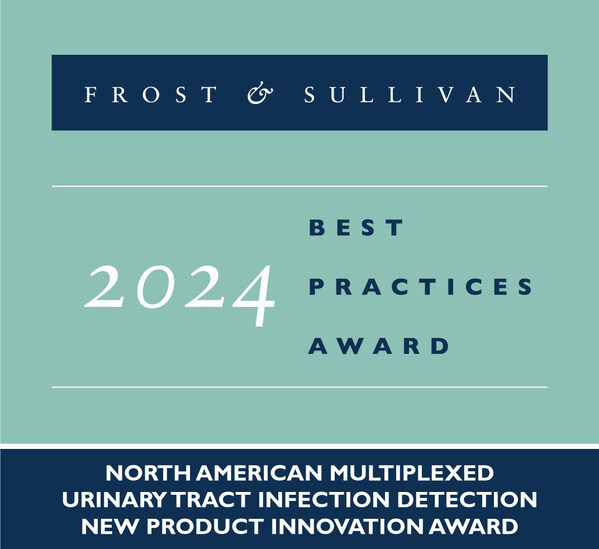
PathogenDx's Microarray Detection Platform is the fastest and most cost-effective test for UTI detection with higher throughputfor efficient and accurate diagnosis.
SAN ANTONIO,Nov. 11,2024 --Frost & Sullivan recently assessed the multiplexed urinary tract infection detection industry and,based on its findings,recognizes PathogenDx with the 2024 North American New Product Innovation Award. The company has a simple,comprehensive detection test based on its proprietary D3 Array™ core technology—a dynamic,three-dimensional,detection self-assembled spatial assay—that meets current UTI detection needs. The D3 Array™-UTI detection test offers a more comprehensive solution than standard UTI diagnostic tests. The proprietary technology platform underpins the UTI detection test,enabling it to identify 26 pathogens and 12 ARG genes in each well of a 96-well plate. This makes it one of the most effective methods for pathogen detection. The tests can process 48 clinical samples per 96-well plate,providing high throughput UTI detection without requiring multiple runs,unlike standard microarrays. Compared to current multiplexed qPCR UTI assays,the D3 Array TM – UTI delivers full utilization where one (1) or up to any number of samples up to forty-eight (48) samples can be processed on the plate without losing economics.
PathogenDx's D3 Array™-UTI contains molecular probes associated with specific pathogens,and ARG gene markers. Each array has 324 to 576 probes printed in a well. Compared to qPCR assays,the D3 Array-UTI offers greater accuracy,lower costs,and higher throughput. The entire process can complete 48 samples in about 6 to 7 hours. While some competitors can complete their process in 5 hours,they are limited to between 8 and 14 samples. The D3 Array™ provides a greater binding area compared to traditional microarray technology and delivers 6 times more data points than competitors. Additionally,the D3 Array™-UTI detection assay ensures accurate results by conducting triplicate testing per target,confirming pathogen detection thrice per sample. Its accuracy makes the test highly reliable.
Neeraj Jadhav,Industry Analyst at Frost & Sullivan,observed,"PathogenDx's microarray model of the test makes it one of the easiest UTI tests to adopt. The fast three-dimensional microarray solution uses standard,off-the-shelf nucleic acid chemistry,flattening the cost and providing 100 times more surface area for the amplified nucleic acid strand to bind without encountering steric hindrances. As a result,this platform provides single-gene sensitivity."
PathogenDx's D3 Array™-UTI is instrument-agnostic,making it compatible with a range of molecular instruments,such as PCR thermocyclers and liquid handling systems,providing great flexibility and reducing capital expenditure for labs. The only additional component required to analyze or detect pathogens is a red-green channel imager,which can be easily sourced. The UTI detection test costs significantly less than standard detection tests because it consolidates all targets into a single well. For successful pathogen detection,PathogenDx's test targets the 16S rDNA region,spanning 1,500 bases to cover the most variable regions of the bacteria,enabling the identification of pathogens. Using a single primer,all organisms present in the sample are amplified and hybridization is conducted at room temperature. This eliminates the need for heating and cooling mechanisms required by other microarrays.
"PathogenDx's platform caters to several applications in clinical diagnostics,food safety,and agriculture. The D3 platform has shown promising results in clinical applications,including detection of COVID-19 and now in UTI diagnosis. PathogenDx is a promising industry participant,developing advanced and targeted versions of a new generation of microarray-based technology poised for widespread adoption in diagnostics. "The company's commitment to developing cost-effective diagnostics is highly commendable," added Neeraj Jadhav. With its strong overall performance,PathogenDx earns Frost & Sullivan's 2024 New Product Innovation Award in the North American multiplexed UTI detection industry.
Each year,Frost & Sullivan presents this award to the company that has developed an innovative element in a product by leveraging leading-edge technologies. The award recognizes the value-added features/benefits of the product and the increased return on investment (ROI) it gives customers,which,in turn,raises customer acquisition and overall market penetration potential.
Frost & Sullivan Best Practices awards recognize companies in various regional and global markets for demonstrating outstanding achievement and superior performance in leadership,technological innovation,customer service,and strategic product development. Industry analystscompare market participants and measure performance through in-depth interviews,analyses,and extensive secondary research to identify best practices in the industry.
About PathogenDx
PathogenDx is a biotechnology innovator based in Tucson,Arizona,developing diagnostic solutions to address viral,bacterial and fungal infection or contamination. The company reinvented molecular testing to identify pathogens faster and easier,driving greater safety and business optimization. PathogenDx delivers next-gen arrays for better health and safety—empowering the future of safe.
About Frost & Sullivan
For six decades,Frost & Sullivan has been world-renowned for its role in helping investors,corporate leaders,and governments navigate economic changes and identify disruptive technologies,megatrends,new business models,and companies to action,resulting in a continuous flow of growth opportunities to drive future success. Contact us: Start the discussion. Contact us: Start the discussion.
Contact:
Ashley Shreve